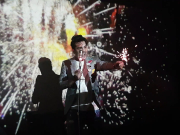 A rock star’s journey to social revolution
A rock star’s journey to social revolution
By Saher Baloch
It is not easy to understand Salman Ahmed, a self-confessed “Jihadi” who was the famed lead guitarist of the now defunct Sufi-rock band, Junoon. He has simple ideas, but through his constant shifting from one thought to another, it seems he does not want to be slotted into any category. He speaks whatever he feels like, and through his answers, comes across as a person who is constantly reinventing himself.
Salman Ahmed has also been appointed as the goodwill ambassador of the United Nations for HIV/AIDS, because of which he has been making appearances on international forums and fund generating functions.
Speaking exclusively to The News, Salman shares his ideas about work, music and his stint as the goodwill ambassador, which allowed him to rub shoulders with who’s who of different professions internationally. Moreover, his latest venture, a book titled “Rock and Roll Jihad”, will also hit the stands soon.
“It took me four long and lonely years to finish this book. All through my life people have wondered, why I chose passion over profession, music over medicine and led an unconventional life style. I felt that Rock and Roll Jihad would be the best way to set the record straight, at least for now, says the singer.
Reminiscing about his past, Ahmed recalls his debut in music industry with the pop group Vital Signs, and later on worked in a few television dramas. After leaving Vital Signs due to creative differences, Ahmed went on to form Junoon, which could lay claim to being South Asia’s biggest rock band.
In the last 15 years, Pakistani music scene has undergone a tremendous change and a bevy of classically trained singers have also come to the fore. How much change he has seen in all these years?
“Pakistani music industry was never short of world class talent and innovation. Right from Nusrat Fateh Ali Khan to modern rock and pop music, the industry has shown glimpses of brilliance, yet unfortunately it has always been one of those endangered species, because of those who wish to put a stop to music.”
Ahmed also adds that the recent trend of Pakistani singers performing in India is a good one which will ultimately be positive for both the countries and says that “it is a win-win situation for both.”
For quite sometime, there has been a prevalence of Islamism developing within the music industry, to which Salman says that he has written an entire chapter in his book about it but nonetheless speaks about an incident where Junaid Jamshed, former lead member of Vital Signs, asked him to stop singing because it is prohibited. “I did not judge him at that point of time, rather I formed my own conclusion by studying Quran and Hadith and realised that it is said by those who want power. As poetry, in whichever form it is put forward, it liberates your thinking and lifestyle, and with due respect to my colleagues, I believe in live and let live.”
When asked whether he thinks that he can be the role model for the youth, he says that it is quite a difficult question to answer. “I have always led my life independently and followed my heart in making most of my decisions. Nevertheless, growing up I was inspired by many different and diverse people and tried to learn to from their good qualities but I made sure that I found my own unique purpose in life as well.”
He says the best he can do is to focus on producing good work as “I think that the youth of today wants liberation from old ideas and set of thinking, so the least I can do is to tell them to pursue their passion vigorously in times of crisis, as the best gift that life can give you is struggle, so make the best out of it.”
In some ways, Salman Ahmed attributes the crisis in the country to the fact that, “as a nation we have stopped aspiring for higher knowledge. By that I do not mean adding degrees and certificates but the knowledge of questioning the injustices that we face on a daily basis. We have let fear paralyse us into believing in things which are not there in reality”. He says that education has always been, and will continue to be, the foundation for stability, no matter what the religion or culture one belongs to.
Speaking about his role as the Good Will Ambassador for the UN, Salman says that he uses the approach of 4Cs, which are compassion, communication, collaboration and co operation. “The concert for Pakistan at the UN General Assembly in September 2009 was a message of unity and helped raise awareness for the Internally Displaced People (IDPs) in Swat and Malakand, through our organisation www.ssgwi.org.
In one of his articles on Taliban and the crisis in Pakistan, Ahmed wrote that in its 60-plus years of independence, Pakistan has been held together by its music, poetry, films, literature and sports. Even after being an overwhelmingly Muslim nation, it is culture and not religion which binds people together. He says that his next album, “Love Can You Take Me Back”, is about building a future of compassion through interfaith dialogue.
Concluding the interview, Salman Ahmed says that he went for an unusual name, Rock and Roll Jihad, for his book because it is a symbol for freedom, justice and passion. “All of us have to rescue the word Jihad from the terrorists and understand its true meaning which is positive. Jihad means to strive against our ego and our limitations. It means to uplift ourselves as well as the poor and downtrodden because when you look from your heart, all masks fall down.”
Source : The News



































